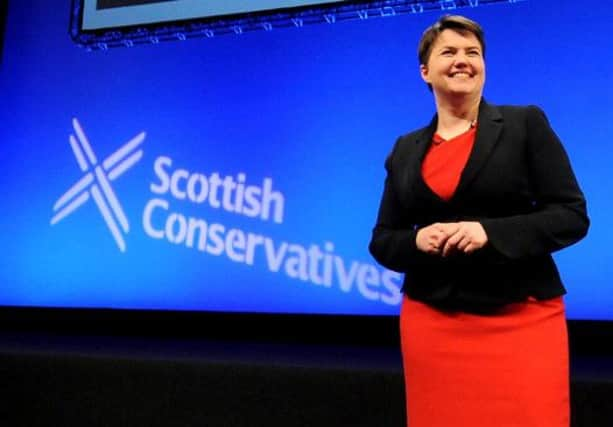Brian Monteith: Recovery chance for Scots Tories


The traditional view of conservative parties is that they seek to preserve the best institutions within a society and support only gradual reform. That all changed in 1975 when Margaret Thatcher became the leader of the Conservative Party, for she and her mentors had identified that to be conservatives in an economy moving ever closer towards state domination meant preserving socialism’s post-war advances.
Hitherto, a Labour government bringing in legislation that expanded the welfare state or nationalised large sections of industry would be followed by a Conservative government that accepted those changes. Another Labour administration would then advance the cause of socialism even further.
Advertisement
Hide AdAdvertisement
Hide AdThe new approach of Thatcher and her disciples meant that while she would concede tactical settlements (such as agreeing to miners’ wage demands in 1981) she would work towards a strategic goal of reducing the scale of state intervention, believing that greater personal freedom was not only morally just, but would also lead to greater universal prosperity.
Given that by the late Seventies Scotland had a larger share of state industry than most of the rest of the UK it was always the case that gradual reform would take too long in the parliamentary cycle to achieve the economic progress that could bring popularity. This meant a more radical approach was required than that being tried in England – but the Scottish Conservatives were not philosophically committed to such a rigorous agenda. The party therefore endured the necessary economic change without reaping the electoral rewards that it enjoyed elsewhere.
Worse still, because of Scotland’s dependence on the state, every attempted reform was portrayed as being anti-Scottish, no matter the jobs being lost from similar policies in Wales, and all parts of England. This effectively demonised Tory governments so that even when the economic improvements came, the party was never rewarded with the recovery it deserved.
Addto that the many damaging myths surrounding issues such as the poll tax and Ravenscraig, which I have addressed before but for brevity must pass over here, and it is surprising it took until 1997 for the Tory Party brand to reach its lowest ebb.
Since that Westminster wipe-out, there has been a recovery of sorts. But although the party has had a single MP since 2001, it has never managed to breakout from the bridgehead it gained in the Scottish Parliament and has since started to lose ground again.
In part this is because of the lack of ambition of its past leaders. There was a moment in Scottish politics when, with John Swinney defeated and the SNP demoralised in the Holyrood election of 2003, and the Scottish Conservatives winning in Ayr, Edinburgh Pentlands and Galloway, the Tories should have aspired to become the second largest party. The then leader David McLetchie could have gone on the offensive with tax-cutting policies and a commitment to increasing Holyrood’s powers that would make it more self-sufficient and accountable. Instead he believed that a hoped-for Tory Westminster victory in 2005 would bring an electoral “bounce” in 2007 and waited in vain for it to happen.
In two subsequent elections Annabel Goldie treaded water, relegating policy innovation behind becoming everyone’s favourite auntie, but it did not work even for her, never mind her party. In the seat she fought for a fourth time she moved from second to third and the party’s vote share dropped to an all-time low. Gaining plaudits for fighting a good campaign did not translate into votes.
It is in this context that the Scottish Conservative and Unionist Party is now operating. Talk of Tories winning three seats in May is dependent primarily on holding ground and a collapsing Liberal Democrat vote turning to them rather than the SNP – there are no winnable Labour-Conservative marginals in sight. The likelihood of its sole MP David Mundell losing his marginal seat remains a possibility.
Advertisement
Hide AdAdvertisement
Hide AdWhen the election for the Scottish Conservatives’ leader was held back in November 2013, I feared the Tories would end up stuck with their old, failed policies and an approach of “one more heave”.
Thankfully the winner, Ruth Davidson, learnt very quickly that if she was to make a vote-shifting impression she had to build an attractive platform that appealed to the core right-of-centre vote in Scotland, not all of them Tories any more. She began to change tack, acknowledging that for Holyrood to become truly accountable it would have to take responsibility for raising most of the funds its spends and, crucially, announcing that she aspired to use such powers as were already coming – as well as those that will come in the future – to cut personal taxes.
So we now go into an election where, thanks to her bold, open and honest approach, Ruth Davidson has done more than anyone in recent living memory to recast what being a Scottish Conservative means. She has been open about her lifestyle on matters that could have been said to be her own business, has been radical in policy, offering tax cuts where McLetchie and Goldie would not tread and reviving the idea of childcare credits. She defend unionism stoutly in the referendum and came out the other side mentioned justifiably in dispatches.
With an economic recovery, an effective leader in Davidson, a prime minister who regularly polls better than Ed Miliband, with Scottish Labour in turmoil, the Liberal Democrats in disarray and nationalists humiliated in areas they thought secure – what better circumstances can the Scottish Conservatives want? If Davidson’s party cannot advance now, the question has to be asked what more can be done and what future lies ahead for the party’s 15 MSPs in Holyrood?
FOLLOW US
SCOTSMAN TABLET AND MOBILE APPS